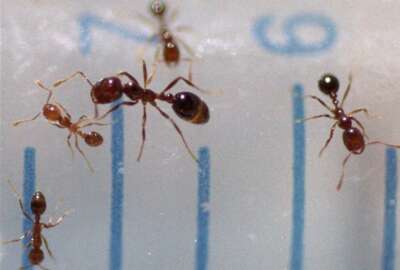
Pols debate pandemic. Feds do something about it
While the politicians insult one another, the regular folks try to get things done.
Interrupted impolitely and persistently by President Trump, an exasperated Joe Biden returned with a social faux pas of his own: “Will you shut up, man?” Not the sort of performance you would have seen between, say, Walter Mondale and Ronald Reagan. As informative as a frog chorus in a springtime pond, this week’s election debate did make you wonder about future stewardship of federal agencies and their people.
Politics have never been particularly civil. People who trade in the currency of power don’t fool around. Not if they want to win. Wednesday night I attended the Zoom launch of a lauded biography of James A. Baker III, written by Peter [no relation] Baker and his wife Susan Glasser. Among the 300 people were former White House chiefs of staff, a prime minister, a couple of members of Congress, and many journalists – they used to be called reporters or scribblers – who write about politics. Also, several luminaries of national television. Although I rarely watch or listen to the TV people, preferring four or five newspapers each day, it was a fun view into the stratospheric layer of the political-governmental-media complex. Peter Baker and Glasser were interviewed by no less than David Rubenstein.
As a regular guy whose stock and trade are the regular people who make up the nuts-and-bolts foundation of government, I thought to myself, “What am I doing here?”
The book title, “The Man Who Ran Washington” might be a bit hyperbolic, but it’s a really good account of a politically gifted man – no saint, and by all accounts unsentimental in how he plied his trade. I imagine that during his stints as Secretary of Treasury and State, Baker dealt deftly with the high level career people and at least refrained from dumping on everyone else.
At its extreme, indifference, schizophrenic policy, malfeasance and dirty politics can filter down to the street levels. Another new book about the early years of the CIA details the fates of four career spies. “The Quiet Americans” author Scott Anderson thrillingly juxtaposes the politics of the era with the covert operation side of four agents on the ground. The work of E. Michael Burke, Henry North, Peter Sichel and Frank Wisner ends mostly in total disillusionment. Although three had colorful and successful post-government careers. Burke convinced CBS to acquire the New York Yankees. Remember Blue Nun wine from the fondue era? That was Sichel. North managed the Ringling Brothers and Barnum & Bailey Circus, a family business. Wisner, alas, retired from the CIA and committed suicide three years later at 56.
This all came to mind as a droll video arrived in my inbox. It concerned the coronavirus. Specifically the career fed most closely associated with trying to get a lasso around the pandemic. The only career person I can think of who has inspired lawn signs.
In giving the redoubtable Dr. Anthony Fauci its Federal Employee of the Year Award, the Partnership for Public Service got the Washington Nationals’ presidential mascots to ham up the presentation at Fauci’s front door. Fauci, the director of the National Institute of Allergy and Infectious Diseases, has managed to stick to his guns while stepping in, over, and around the twisted brambles of the Trump administration’s presentation of its response. To be fair, the government’s actions have been better than the rhetoric.
A moment ago I mentioned regular people. By regular I mean not famous. But often gifted. A research project conducted jointly by the Naval Research Laboratory and the NIH’s National Center for Advancing Translational Sciences has resulted in a promising breakthrough in combatting COVID-19 and other nasty viruses. The paper describing it received rapid publication in a peer reviewed journal called ACS Nano. It has headlines like this: “Challenges and Opportunities in Designing Perovskite Nanocrystal Heterostructures.”
The NRL-NCATS article carries this title: “Quantum Dot-Conjugated SARS-CoV-2 Spike Pseudo-Virions Enable Tracking of Host Cell Surface Angiotensin Converting Enzyme 2 Binding and Endocytosis.” Something in that caught my eye. Of course! I’ve been taking an Angiotensin Converting Enzyme inhibitor for years to control blood pressure.
You know those red spikes sprouting from the coronavirus sphere you see on television all the time? Those spikes give the virus the mechanism to penetrate human cells and do their dirty work. Essentially, NRL scientist Mason Wolak explained to me, NRL nanotechnology experts were able to attach the spikes to a light-emitting speck of material the size and shape of a real virus. The resulting structures were shipped to NCATS, which has the means to inject them into test subjects and study their mechanics without the risk of infection.
Wolak said that while the concept is easy to visualize, it takes years of increasing expertise in nano and rather extremely precise chemistry. He wasn’t boasting, and he referred to the depth of NRL’s collective expertise in nano. He was quick to credit Dr. Kirill Gorshkov, his (contractor) counterpart at NCATS for their part.
And here’s what is most remarkable about the NRL-NCATS breakthrough. The follow-on research is applying the knowledge to thousands of FDA-approved drugs that could have the effect of rendering a person’s cells impervious to the virus. Not a vaccine, but a different kind of protection. Conditions that allow work like this to happen – that’s what feds deserve from the politicals.
Nearly Useless Factoid
By Alazar Moges
Ireland’s Supreme Court this week ruled that bread sold by the fast food chain Subway contains so much sugar that it cannot be legally defined as bread. The ruling came in a tax dispute brought by Bookfinders Ltd., an Irish Subway franchisee, which argued that some of its takeaway products were not liable for value-added tax. A panel of judges rejected the appeal Tuesday, ruling that the bread sold by Subway contains too much sugar to be categorized as a “staple food,” which is not taxed.
Source: Associated Press
Copyright © 2025 Federal News Network. All rights reserved. This website is not intended for users located within the European Economic Area.
Tom Temin is host of the Federal Drive and has been providing insight on federal technology and management issues for more than 30 years.
Follow @tteminWFED





